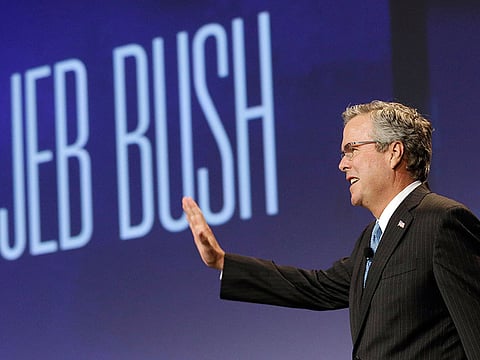‘Shock-and-awe’ play by Bush could backfire
By leaning early on many people who owe their careers to his father or his brother, Jeb is breaking with tradition

Jeb Bush made a bold play in announcing a large roster of foreign policy advisers for his expected presidential campaign, and it drew the ire of many in the Republican foreign-policy world. Ahead of his speech last Wednesday at the Chicago Council on Global Affairs, Bush’s aides released the list of experts whose careers span the administrations of Ronald Reagan, George H.W. Bush and George W. Bush. Meanwhile, in his speech, he pitched himself as aligning with none of those past presidents: “I am my own man.”
Among many Washington Republicans, Bush’s showcasing of his adviser list was seen as a brazen attempt to present the image of a front-runner and even a veneer of invincibility. Several Republican foreign policy veterans bristled at what they saw as the campaign’s effort to pressure top experts to commit to him before the primary campaign has even started and before other prospective candidates have been able to make their cases.
“I’ve certainly heard that view expressed,” said former Romney adviser and under secretary of defence for policy Eric Edelman, referring to the angst in GOP foreign policy circles about Bush’s tactics. “It’s not a good thing for any campaign to project an air of entitlement. The shock and awe Jeb has attempted on the fundraising side now extends to the policy side, where they are trying to lock down support,” said a Republican who advised Mitt Romney on foreign policy in 2012 and who has not yet committed for 2016. “They want monogamy. But not everybody they approached said yes.” Top aides to Bush, including former Wal-Mart chief executive officer Bill Simon, have been meeting with a host of Republican ex-officials, think-tank scholars and political operatives to ask them to sign on now. The pressure is implicit, because those who decline risk being cut out of the inner circle as the campaign moves forward.
Real downside
But there’s a real downside for Bush in naming so many brain-trust members so early, several GOP former officials told me. For one thing, by listing several people who fundamentally disagree on major issues, Bush may be setting up a team that is perpetually in conflict. Potential voters could also be confused by a team that has no clear ideological identity, especially one advising a candidate who has little to no foreign policy experience. Still, said Edelman, Bush may benefit ultimately by including people from across the Republican foreign policy spectrum. And top advisers who served in both previous Bush administrations could provide a bridge between the realists and the neoconservatives. Another potential problem for Bush is that by making his team public now, their comments and actions become attributed to the campaign.
Similarly, Bush has already been criticised for taking on advisers who had a role in the 2003 Iraq invasion. In his speech, Bush said that mistakes were made during the Iraq war but that his brother’s decision to surge troops there in 2007 was “one of the most historic acts of courage politically” he had ever seen. He criticised President Barack Obama’s decision to withdraw all troops in 2011.
In the end, campaign foreign policy teams tend to be used sparingly anyway. But the tradition in Washington, especially in the Republican Party, is that foreign policy heavyweights wait until late in the campaign to choose a candidate. By leaning early on many people who owe their careers to his father or his brother, Bush is breaking that tradition. Now that he has taken on so many advisers, he could struggle to uphold his pledge to be his own man.
— Washington Post
Josh Rogin is a Bloomberg View columnist who writes about national security and foreign affairs.


